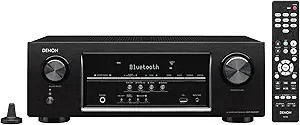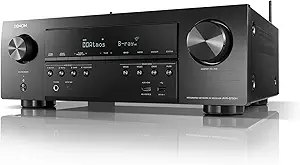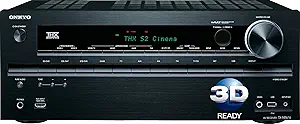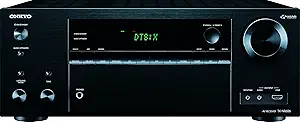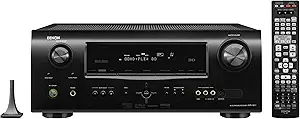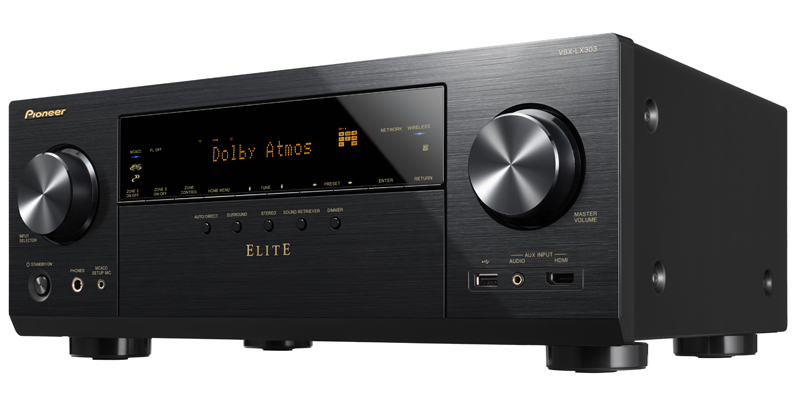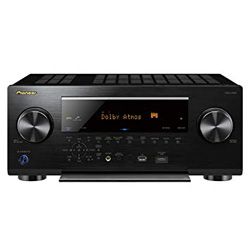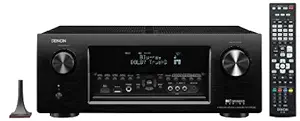Denon AVRS530BT VS
Pioneer VSX-532
Pros & Cons
Denon AVRS530BT
VSPros
- Remote Control is intuitive and easy to use.
- A large variety of ways to calibrate the sound for your set up using the built-in microphone.
Cons
- It’s getting hot just after a few hours of work.
- A little bit low wattage per channel that makes crank up the volume to achieve the optimal DBS.
Pioneer VSX-532
VSPros
- I am glad that built-in decoders play almost all of my files properly. It is 100% worth of its price.
- The total power output is 210 Watts, which is enough for enjoying proper sounding in my living room.
- Not very important, but anyway, it can be both auto/manually switched on.
Cons
- It does not have auto power off, so it bothers me each time to turn it off manually.
- For me not so important, but note that it does not have networking capabilities.
- The main disadvantage for me is that it cannot be controlled via a smartphone.
Specifications
Groups
| Specification | Denon AVRS530BT | Pioneer VSX-532 |
|---|---|---|
| Built-in Display | ||
| Type | fluorescent | fluorescent |
| Colour | black | black |
| Signal Processing | ||
| 3d Pass-through | ||
| Video Conversion/scaling | HDMI to HDMI scaling, analog to HDMI up conversion | HDMI to HDMI scaling |
| Hdmi Pass-through | up to 4K | up to 4K |
| Upscaling Via Hdmi | up to 4K | up to 4K |
| Connector Type | ||
| Coaxial Digital Outputs | has not | has not |
| Optical Digital Outputs | has not | has not |
| Hdmi Outputs | 1 | 1 |
| Hdmi Inputs | 5 | 4 |
| Coaxial Digital Inputs | 1 | 1 |
| Optical Digital Inputs | 2 | 1 |
| Phones | 1 | 1 |
| Av Inputs | has not | 2 |
| Usb | 1 | 1 |
| Subwoofer Outputs | 2 | 1 |
| Radio | ||
| Tuner Bands | AM/FM | AM/FM |
| Tuner Type | digital | digital |
| Preset Station | 40 | 30 |
| Additional Features | ||
| Auto Power Off | ||
| Bi-amplifying | ||
| Audio Return Channel (arc) | ||
| Apple Air-play Support | ||
| Advanced Sound Retriever (asr) Technology | ||
| Three-zone Capability | ||
| Smartphone Remote Control | ||
| A-b Speaker Switch | ||
| Dual-zone Capability | ||
| Pure Direct Mode | ||
| Amplifier | ||
| Total Harmonic Distortion | 0.08 % | 0.08 % |
| Frequency Response | 20 Hz-20 kHz | 20 Hz-20 kHz |
| Output Impedance Per Channel | 6 Ohm, 8 Ohm | 6 Ohm, 8 Ohm |
| Output Power Per Channel | 110 W, 140 W, 75 W | 150 W, 80 W |
| Total Output Power | 450 W | 210 W |
| Clock | ||
| Built-in Clock | ||
| Sleep Timer | ||
| Audio Formats | ||
| Mp3 | ||
| Flac | ||
| Apple Lossless | ||
| Aiff | ||
| Aac | ||
| Wma | ||
| Wav | ||
| Built-in Decoders | ||
| Dolby True Hd | ||
| Dolby Surround | ||
| Dolby Digital Plus | ||
| Dolby Atmos | ||
| Dts:x | ||
| Sound Features | ||
| Digital Content Protection | HDCP 2.2 | HDCP 2.2 |
| Surround System Class | 5.2 channel | 5.1 channel |
| Surround Sound Effects | Theater-Dimensional Virtual Surround | Front Stage Surround Advance. Headphone Surround (V.S.S.) |
| Audio D/a Converter | 24bit / 192kHz | 24bit / 192kHz |
| Media Content Source | ||
| Usb-host | ||
| Network | ||
| Bluetooth | ||
| Connectivity Interfaces | ||
| Ieee 802.3u | ||
| Ieee 802.3 | ||
| Wi-fi | ||
| Bluetooth | ||
| Dimensions | ||
| Dimensions | 12.6 x 17.1 x 5.9 inches | 12.6 x 17.1 x 6.6 inches |
| Functions | ||
| Network Audio Player | ||
| Internet Radio | ||
| Digital Player | ||
| Power Device | ||
| Standby Power Consumption | 0.1 W | 0.35 W |
| Operational Power Consumption | 140 W | 210 W |
| General | ||
| Brand | Denon | Pioneer |
